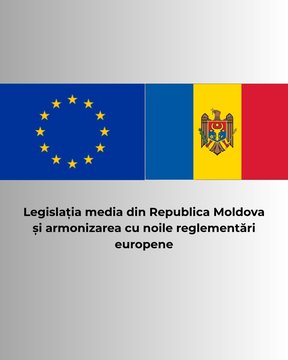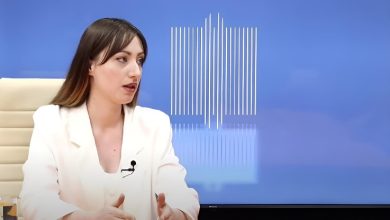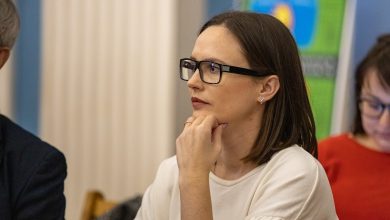Media legislation in the Republic of Moldova and harmonization with new European regulations
Activewatch

The Moldovan authorities have demonstrated political commitment to aligning with EU media and digital regulations. The process has, thus far, been transparent and collaborative, contributing to improvements in the country’s legal framework on press freedom. However, its advancement and long-term continuity remains uncertain, as limited institutional capacity might hinder this process, while political developments—particularly the upcoming parliamentary elections this September—will be a decisive factor.
General context
Republic of Moldova’s process of accession to the European Union is having an impact on its media legal framework, media regulatory institutions, as well as on its media market and its overall information landscape. This process began in 2014 with the signing of the Association Agreement. In 2022, Moldova was granted official candidate status, and accession negotiations commenced in 2024 and are currently ongoing. The expectation is that Modova will become a full EU member by 2030, but this outcome is heavily dependent on the political developments in Moldova, with the upcoming general elections in September 2025 playing a crucial role. Besides, the geopolitical context marked by the war at its borders contributes to the climate of uncertainty marking the process of accession. No matter the final outcome, significant changes in the legislative and institutional framework regulating the media have been made or are underway. Our article aims to briefly explore both the process and these changes.
In the 2025 annual Press Freedom Index, published by Reporters Without Borders (RSF), Moldova is ranked 35th globally, ahead of established democracies (USA) or even EU members (Italy, Romania, Hungary, Slovakia). The RSF report states that Moldova’s media are ”polarised between pro-Russian and pro-Western camps”. As a positive development in the recent years, RSF considers that “the control oligarchs and political leaders exerted over editorial positions has decreased”, and the country’s media landscape has become more pluralist, which contributed to the improvement of the country’s ranking.
The European Commission 2024 Enlargement report on Moldova states that “Moldova has some level of preparation in freedom of expression and has made some progress notably by adopting new legislation on access to information, media ownership concentration and establishing a media subsidy fund”.
Institutional framework
- Several institutional frameworks of cooperation have been designed in order to facilitate the process of accession. Some of them have been developed in partnership with the EU institutions, others were developed among the internal institutional framework of Moldova.
The Association Agreement includes a chapter dedicated to the media and audiovisual policies (Chapter 25 Cooperation in the field of culture, audiovisual policy and mass media). Specifically, article 133 states that Moldova is bringing its national legislation closer to EU normative acts and international instruments, while articles 131 and 132 mention dialogue and cooperation to promote the audiovisual industry, as well as cooperation in the media field.
Another important instrument is the Memorandum of Understanding Between the European Parliament and the Parliament of the Republic of Moldova Regarding a Common Framework to Support Parliamentary Democracy. It was signed in 2021, with the aim to implement the Association Agreement and to improve the legislation and the legislative process of Moldova in the context of the EU accession process.
- Internally, Moldova developed a series of mechanisms, from consultative bodies to strategic documents to facilitate the process of EU accession.
The Center for Harmonization of Legislation, an administrative authority subordinated to the State Chancellery, was created in February 2007 and has the mission of coordinating the process of harmonizing national legislation with that of the European Union.
In 2022, the Parliament’s Committee on Culture, Education, Research, Youth, Sport and Mass-media hosted a working session dedicated to improving legislation in the mass media field and established a Mass-media Subcommittee, as well as the Consultative Group of Experts on the Improvement of Media Legislation, which includes representatives of civil society and ministries. This group of experts has been actively involved in the process of drafting the law proposals which aim to transpose the EU regulations, such as the recently adopted changes to the Audiovisual Media Services Code (CSMA).
In another joint initiative, the Parliament, the civil society and the media established in 2022 the “Democracy Triangle”, a program which aims to combat disinformation, protect freedom of expression and preserve democracy. The program is part of the activities included under the auspices of the Memorandum of Understanding between the Parliament of the Republic of Moldova and the European Parliament, mentioned above.
- In parallel, the Moldovan authorities have adopted a number of strategic documents aimed at strengthening the media through public policies.
In 2018, the Parliament adopted The national outlook on the mass-media development in the Republic of Moldova. One of its main goals was “completing and adjusting the national media regulation legislation with rules that are in line with EU legislation and international good practices in the field”.
The national program for the development of the media 2023–2026 was adopted in 2023 by the Parliament. It is an extensive document, which includes a thorough analysis of the media legal, economic, professional environments and outlines major and specific objectives for all three of them.
The Program mentioned above was accompanied by an Action plan, adopted in 2023, and which detailed the specific actions, terms and institutions responsible for the implementation of the objectives outlined by the Program.
The legislative process of adopting EU regulations
As a EU candidate, Moldova has to align its national legislation to the EU regulatory framework. The calendar for adopting/transposing the regulations is not identical to that dedicated to the EU members.We shall refer in this article to the following EU regulations affecting the media market: Audiovisual Media Services Directive (AVMSD), Digital Services Act (DSA), European Media Freedom Act (EMFA), Digital Markets Act (DMA).
The European Commission 2024 Enlargement Report recommends that the Republic of Moldova “adopt and implement media and digital services legislation in line with the EU acquis, including the EU Media Freedom Act and the Digital Services Act”.
The process of transposing the EMFA, DSA, and DMA regulations is currently underway, with certain provisions already incorporated into the recently adopted amendments to the Audiovisual Media Services Code (CSMA)
In regards to the EU 2010/13 Audiovisual Media Services Directive (AVMSD), Moldova had already made steps towards the transposition of its provisions into national legislation. The first one was in 2018, when the Parliament adopted the Audiovisual Media Services Code (CSMA). It was the result of a joint working group (representatives of the media and human rights national and international NGOs, broadcasters, lawyers, MPs, members of audiovisual regulator) which was set up in a EU-CoE Project (“Promoting media freedom and pluralism in the Republic of Moldova”).
The CSMA suffered several modifications since it was adopted, some of them related to the content quotas coming from countries which have ratified the European Convention on Transfrontier Television. Others came in response to disinformation concerns, especially related to the war in Ukraine. These amendments reintroduced the definition of disinformation and imposed stricter sanctions for violations, including license suspensions. In 2023, CSMA suffered changes aimed to reduce market concentration and promote a diverse media landscape.The mechanisms of appointing and dismissing the board of the public service media have become an issue since 2021, when changes brought to the CSMA raised concerns about the autonomy of the public media from political control. This situation was addressed by the changes brought in July 2025 to the CSMA.
In July 2025, the Moldovan Parliament adopted new changes to the Audiovisual Media Services Code. The draft proposals were once again the result of a collaborative effort, developed by a working group** that included parliamentarians, representatives of the Audiovisual Council, experts from the Ministry of Culture, and international specialists, drawing on recommendations put forward by civil society organizations during the 2024 Moldova Media Forum.
The recent modifications of CSMA seek to harmonize its provisions with the updated AVMSD 2018/1808, as well as to EMFA and other EU regulations*. The procedures for appointing members of the audiovisual regulatory authority and managing the national public media service were improved to meet the requirements set out in EU regulations (EMFA) or the recommendations included in the European Commission annual country reports. The new CSMA also contains provisions aimed at the transparency of the ownership and financing of media service providers and distributors, in line with EMFA provisions. It also extends the ownership transparency requirements to online and print media.
The activity of video sharing platforms located in Moldova is also part of the new CSMA regulations, on issues related to the protection of minors, hate speech or illegal content (public incitement to commit a crime of terrorism, crimes related to child pornography, crimes of a racist and xenophobic nature), harmonizing several EU regulations*.
Other provisions of the EMFA are currently part of an undergoing process of modification of the advertising law. The changes include transparent and non-discriminatory criteria for the allocation of public funds based on media diversity, editorial independence, thematic profile and compliance with ethical norms, as well as the annual reporting obligation of public sector entities and media service providers/online platforms regarding state advertising and messages of public interest.
According to The National Action Plan for the Accession of the Republic of Moldova to the European Union for the years 2024-2027, legislative project proposals for the transposition of both DSA and DMA should be submitted by October 2026.
Some of the above mentioned EU regulations have already been tested ahead of the 2024 presidential elections, as well as in June 2025. They will be tested again during the parliamentary elections due this September. European Commission and Moldovan authorities conducted threat assessment and election readiness exercises with online platforms, Moldovan civil society organisations, fact-checkers and independent media.
One other important issue addressed by the 2024 Enlargement Report relates to the national mechanism allowing the suspension of TV channels. This is regulated through the strategic investment law, which was amended in December 2023 to include a mechanism to suspend the licences of TV channels that cannot prove their final beneficial owner. The European Commission considers that this mechanism should be reviewed and brought in line with EU and international standards.
- Moldova has the obligation to transpose these EU regulations as part of its EU accession process. But how do the experts and officials view these new regulations? Do they respond to the needs of the Moldovan media? Are they necessary?
“These legislative changes are necessary and beneficial for the media market, but for media institutions the main challenge remains their economic sustainability”. (Anton Ialău, Head of the Media Policy Department, Ministry of Culture of Moldova)
“These regulations respond only to a small extent to the real needs of the media space in the Republic of Moldova, as the transposition is partial and fragmentary. However, they are extremely important in that they aim to remedy some essentially dysfunctional mechanisms, such as the procedures for appointing and revoking the members of the Audiovisual Council and the management of the public media service provider, where the risks of political influence remain high”. (Cristina Durnea, media expert, Center for Independent Journalism)
“They respond to a sufficient extent. Additional measures are needed regarding economic development, the advertising market, other measures to increase financial independence”. (Liliana Vițu, President of the Audiovisual Council of the Republic of Moldova)
- Currently, there exists a number of programs which offer support to Moldova in its process of legal harmonization.
On the Digital Services Act, the Secretariat of the Economic Council has already published an assessment, which consists in the evaluation, elaboration of a draft law and the promotion of legislative harmonization and will be used in the legislative process of transposing the DSA.
The EU4Digital Facility is currently supporting Moldova and Ukraine in harmonizing their national legislation with the provisions of the Digital Markets Act and Digital Services Act. Working together with the Ministry of Economic Development and Digitalization, the EU4Digital Program will assess the draft legislation on digital services and offer recommendations to ensure alignment with EU DMA and DSA standards.
Moldova is currently part of a four-year project financed by the Council of Europe, which, among other goals, aims to “further improvement of audiovisual, media, and access to information regulatory legal framework in light of previous Council of Europe recommendations and requirements of the EU accession talks and support for its implementation”. This project offers an opportunity to advance the process of harmonization and transposition of the aforementioned regulations.
Main challenges in the process of harmonization
The complex process of legal harmonization presents several notable challenges. Experts and officials we interviewed highlighted institutional capacity as a key concern, particularly due to a shortage of qualified human resources. Additional challenges include the consistency of political will and the coherence of the broader legislative strategy. While there is recognition of the current administration’s commitment to reform, a major concern remains whether this political will can be sustained, especially in the event of a change in government following the parliamentary elections scheduled for this September.
“The main challenge in the process of harmonization is the lack of a coherent legislative strategy and consistent political will. Late initiation of the transposition/consultation process of the projects referred to above. Another major problem also relates to the reduced institutional capacity for monitoring and effective enforcement of European standards (including those regarding online platforms, illegal content, etc.).” (Cristina Durnea, media expert, Center for Independent Journalism)
“The main challenge in the process of harmonization is the lack of human resources and low salaries, which affects institutional capacity.” (Liliana Vițu, President of the Audiovisual Council of the Republic of Moldova)
“The current government shows evident political will, and I want to believe that after the autumn elections the situation will not change in this sense.” (Anton Ialău, Head of the Media Policy Department, Ministry of Culture of Moldova)
“The situation remains uncertain, and the real political commitment to the implementation of the new regulations will be able to be assessed only after the autumn elections, when a new parliamentary configuration will most likely take shape.” (Cristina Durnea, media expert, Center for Independent Journalism)
A notable aspect of this legislative harmonization process is its open, transparent, and consultative nature, involving various bodies and collaborative mechanisms between authorities, experts, civil society, and international specialists. However, one of the experts we interviewed pointed out that the consultation process was not fully comprehensive, as it was carried out under tight deadlines and did not engage all relevant stakeholders.
“Yes, it was open, transparent. In addition to the specialized parliamentary committee, a group of experts** was established, with representatives of the CJI, API, APEL, Internews, Freedom House, who are involved both in the drafting of the amendments, as well as in the finalization of any legislative initiatives regarding the media and/or the protection of journalists.” (Liliana Vițu, President of the Audiovisual Council of the Republic of Moldova)
“Most members in the working group** are representatives of civil society. Several consultations were held – in December 2024 at the media forum, in June 2025, public consultations at the parliament with civil society and the media” (Anton Ialău, Head of the Media Policy Department, Ministry of Culture of Moldova)
“The draft laws were developed within the Consultative Group of Experts on the Improvement of Media Legislation**, a structure made up of members of the relevant parliamentary committee and experts from civil society organizations. Although this platform facilitated a technical dialogue between legislators and specialists in the field, the process cannot be considered a genuine public consultation. The consultation on the projects was carried out in an extremely tight time frame, without a broad debate involving the entire media industry or other interested actors.” (Cristina Durnea, media expert, Center for Independent Journalism)
*An official evaluation made by the Center for Harmonization of Legislation makes an exhaustive list of the EU regulations which the new changes of the CSMA cover: Regulation (EU) 2022/2065 of the European Parliament and of the Council of 19 October 2022 on a single market for digital services and amending Directive 2000/31/EC (Digital Services Regulation), Regulation (EU) 2024/1083 of the European Parliament and of the Council of 11 April 2024 establishing a common framework for media services within the internal market and amending the Directive 2010/13/EU (European Regulation on media freedom), Directive (EU) 2018/1972 of the European Parliament and of the Council of 11 December 2018 establishing the European Electronic Communications Code (reform), Directive (EU) 2017/541 of the European Parliament and of the Council of 15 March 2017 on combating terrorism, Framework Decision 2008/913/JHA of the Council of 28 November 2008 on combating certain forms and expressions of racism and xenophobia through criminal law, Commission Communication COM/2018/236 final “Combating disinformation online: a European approach”, as well as the provisions of the Charter of Fundamental Rights of the EU and the Treaty on the Functioning of the EU (in particular the principles of freedom of expression and information, freedom to establish and provide services, consumer protection and media pluralism).
**Consultative Group of Experts on the Improvement of Media Legislation – the working group includes members of the relevant parliamentary committee, representatives of the Audiovisual Council, experts from the Ministry of Culture, experts from civil society organizations and international specialists.
***
This publication is the result of activities carried out within “MAAM – Media Advocacy Action for Moldova: Empowering Moldova’s Public Watchdogs to Safeguard Media Freedom”, a project co-funded by the CEI Fund of the European Bank for Reconstruction and Development (EBRD), with the contribution of the Italian Ministry of Foreign Affairs and International Cooperation.
The views expressed in these materials are solely those of the authors and do not necessarily reflect the positions of the European Bank for Reconstruction and Development (EBRD) and the Italian Ministry of Foreign Affairs and International Cooperation.
MAAM is a collaborative initiative led by Osservatorio Balcani Caucaso Transeuropa (OBCT), in partnership with the Independent Journalism Center (IJC) in Moldova and ActiveWatch in Romania.




